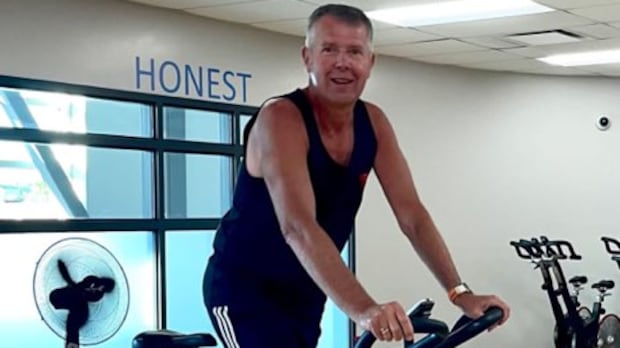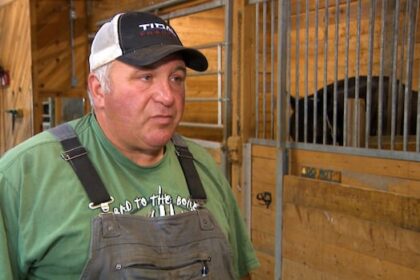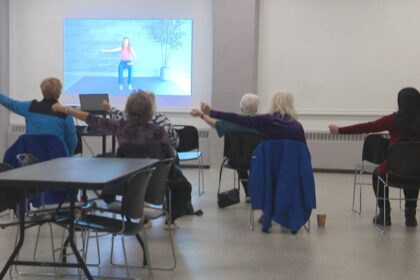New BrunswickA community program is aiming to help those at risk of Type 2 diabetes transform their lifestyle. Community program connects those at risk of Type 2 diabetes with lifestyle coaching and exercise facilitiesJennifer Sweet · CBC News · Posted: Nov 16, 2025 5:00 AM EST | Last Updated: 3 hours agoListen to this articleEstimated 5 minutesThe audio version of this article is generated by text-to-speech, a technology based on artificial intelligence.Al McAlpine went from being inactive and at risk of Type 2 diabetes to teaching a spin class at the YMCA of Southwestern New Brunswick. (Submitted by Sherry Fitzgerald)A year ago, Al McAlpine was relatively inactive, carrying extra weight that he put on during the pandemic and at risk of developing Type 2 diabetes. Today, the 61-year-old is fit as a fiddle and teaching spin class at the YMCA of Southwestern New Brunswick, a turnaround he chalks up to a free, four-week program that offers coaching in fitness and nutrition.“I’ve shed 50 lbs now,” said McAlpine. “I’m sure it’s going to affect my health in the long run.”The program McAlpine joined is called Small Steps for Big Changes. It was started in 2012 by the Diabetes Prevention Research Group at the University of British Columbia.On World Diabetes Week, Small Steps program coaches including Sherry Fitzgerald (right) held a blood testing and health assessment clinic. (Submitted by Sherry Fitzgerald)The YMCA of Southwestern New Brunswick is one of many places now offering it to those at risk of developing Type 2 diabetes.One in every three people is at risk of getting Type 2 diabetes and many don’t even realize it, said Sherry Fitzgerald, the Y’s fitness coordinator.If you’re inactive, overweight, have high blood pressure, have a parent or sibling with Type 2 diabetes or were diagnosed with it during pregnancy, you could be at risk and eligible for this program, she said. Small Steps focuses on lifestyle interventions.“It’s designed to help clients make lasting diet and exercise changes,” Fitzgerald said.The program is targeted toward those at risk of developing Type 2 diabetes. (Yeexin Richelle/Shutterstock)“The good news is that early action with even small changes in diet and exercise, you can prevent Type 2 diabetes or delay it,” she said.Lifestyle changes are twice as effective as drug therapies to reduce the risk of developing Type 2 diabetes, said a release from the Y, which touted McAlpine as a local success story.McAlpine said his wife Bev was the first in the family to sign up for Small Steps.“She would come home quite excited about it every week. And I thought, OK, you know, if it’s good for her, it’s good for me,” he said.He’d been thinking about improving his fitness for years, but never got around to it.McAlpine didn’t think he was pre-diabetic, but a blood sugar test revealed that he was.“It did come as a shock,” he said.“I would say take the plunge. Get tested.”LISTEN | Diabetes Canada on misinformation:Information Morning – Saint John12:36Diabetes Canada on misinformationDiabetes Canada recently launched a campaign to combat stigma. Host Emily Brass speaks with Laura Syron, president and CEO of Diabetes Canada about the blame, shame and misinformation around diabetes.The Small Steps program includes six one-on-one sessions, each lasting an hour, said Fitzgerald. The first part of each session is for counselling and goal setting, the second is exercise.The counselling and coaching is very personalized, she said.“We don’t just tell people what to do, we listen. We explore what matters most to them and help them find their own motivation for change.”Having a coach keeps you accountable, said McAlpine.They talk about good nutrition, review Canada’s food guide and show you healthy choices.They don’t tell you not to each chips or chocolate but advise you to keep it in moderation while focusing more on healthier foods, he said.The coach also checks your heart rate to get an idea what kind of shape you’re in so you can be safe while exercising and monitor your progress.The exercises start out gently, he said.Participants can also use the Y’s facilities outside of their counselling sessions, said Fitzgerald.They have full access to the Y during the program, including all fitness classes, recreation and pool programs, she said.Participants exercise at Y facilities and receive guidance on goal-setting from a coach. (CBC)McAlpine got into the “group ride,” also known as spin class or stationary biking. “It always intrigued me, but I was always a little scared to take that plunge thinking it was for young people,” he said.“So I put on my big boy pants. I took a spin class and I thought, you know what? I actually kind of like this.”Within two or three weeks he had dropped a couple of pounds.“Energy levels increased drastically — even mental well-being. Your whole goal changes as those pounds come off and you feel better about yourself,” he said.McAlpine started going to spin classes five days a week.“I was like blowing everybody out of the water because the pounds were falling off,” he said.Eventually, he was invited to become an instructor.“It’s good for me. It’s good for the membership,” he said. “I’m showing up for them, giving something back.”Anyone interested in the Small Steps for Big Changes program can find information on how to register on the YMCA of Southwestern New Brunswick website, said Fitzgerald.ABOUT THE AUTHORJennifer Sweet has been telling the stories of New Brunswickers for over 20 years. She is originally from Bathurst, got her journalism degree from Carleton University and is based in Fredericton. She can be reached at 451-4176 or jennifer.sweet@cbc.ca.With files from Information Morning Saint John.
From pre-diabetic to spin coach, see how this Saint John man spun his life around











